1. The International Terrorism Situation
The threat posed by terrorism, such as terrorist acts conducted around the globe by Islamic extremists, remains
high despite the governments of countries around the world enhancing their countermeasures against terrorism
following the terrorist attacks on the United States which took place in September 2001. One organization to note
in particular is "Al-Qaeda" led by Usama bin Ladin. This organization has been repeatedly calling out to Muslims
across the world for a "jihad" (holy war), accusing the countries that have supported the use of force by the
United States against Iraq as well as those Gulf and Arab countries that support the United States. Their acts have
in turn influenced other Islamic extremists.
In the Middle East, there was a suicide bomb case in the residential area for foreigners residing in Riyadh, Saudi Arabia in May 2003. Moreover, in 2004, there were further attacks made on the residential areas for foreigners as well as the General Consulate of the United States in Saudi Arabia. In addition, another terrorist bomb attack took place in Beirut, Lebanon in February 2005, and the former Prime Minister, Rafik Hariri, was assassinated. In Iraq, terrorist acts have persisted even after the inauguration of the Iraqi Transitional Government in April 2005.
In Southeast Asia, an Islamic extremist group "Jemaah Islamiya," which is said to be working in conjunction with "Al-Qaeda", carried out several large-scale, indiscriminate terrorist attacks in Indonesia. It has been pointed out that "Jemaah Islamiya" is working together with several Islamic extremist groups in the Philippines.
In Europe, several train cars were bombed simultaneously in Madrid, Spain in March 2004, claiming the lives of 191 people and leaving over 1,600 people injured. Following this, two domestic flight airplanes were bombed simultaneously in August 2004 in Russia, causing the deaths of 90 people. Soon after, in September of the same year, a school in the Republic of North Ossetia-Alania was occupied by terrorists, resulting in the deaths of approximately 330 people from bullets and explosives, as well as injuring over 700 people.
In the United Kingdom, four simultaneous bomb attacks on train cars and a bus occurred in central London in July 2005 when the G8 Summit was being held in Gleneagles. This resulted in the deaths of 56 people and left approximately 700 people injured. A similar terrorist attack occurred two weeks later in London, this time resulting in no deaths or injuries. Many countries were shocked to learn that the perpetrators of these terrorist attacks were youths living in major European countries who had become extremists.
In Africa, a car exploded near a synagogue (Jewish congregation) on Djerba Island in Tunisia in April 2002, and a car bomb suicide attack directed at a Jewish-owned hotel occurred in Mombasa, Kenya in November of the same year. Then in May 2003 bombs were set off almost simultaneously at a total of five places around Casablanca, Morocco. In Egypt, a series of terrorist bomb attacks took place in Taba in October 2004 and in Sharm el-Sheikh in July 2005. As such, there were a number of large-scale, indiscriminate attacks that resulted in a great number of deaths and injuries across the continent.
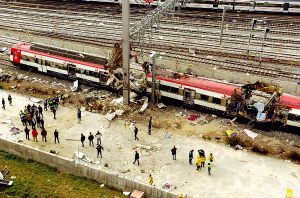 |
| Simultaneous train bomb attacks in Madrid, Spain (March 2004) (Photo: Jiji Press) |
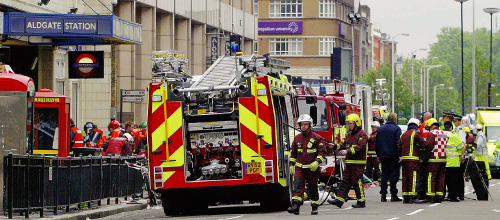 |
| Simultaneous terrorist attacks in London, United Kingdom (July 2005) (Photo: Jiji Press) |
The United States and other countries began the use of force against Iraq in March 2003, and Baghdad, the capital, fell into the hands of US forces and their allying forces the following April. This marked the virtual end of the Hussein administration. In May of the same year, President George W. Bush of the United States declared the end of all major combat operations in Iraq.
Since then, the transfer of sovereignty took place in June 2004, a fact which marked the inauguration of the Iraqi Interim Government. However, public security was allowed to deteriorate and a number of hostage incidents targeting foreigners arose prior to this transfer.
The Elections for Transitional National Assembly took place in January 2005, and the Transitional Government was inaugurated in April of the same year. Nevertheless, the security situation in Iraq has remained unstable even after this occurrence. Terrorist acts by militant groups targeting the US military and other foreign troops in Iraq, security forces, and other relevant members of the Iraqi Transitional Government, as well as those targeting party executive members of Iraq and others have continued to occur frequently against this backdrop of animosity toward the Transitional Government and US military, religious strife, and other factors.
It is believed that in addition to foreign terrorists such as Abu Musab al-Zarqawi, a militant force comprised of a Sunni faction, including the relevant members of the former Hussein administration, are actively at work in Iraq today, which has become one of the hotbeds for the activities of the Islamic extremists. Amidst this situation, Zarqawi made it clear in October 2004 that he was cooperating with Usama bin Ladin. As can be seen from these facts, much attention shall be given to the impact the developments in the situation in Iraq will have on the security situation of the international community.
3. The Terrorist Situation in Southeast AsiaIt is thought that the terrorist network of Islamic extremists has now spread to every corner of the world, including Asia. In Southeast Asia, terrorist attacks by "Jemaah Islamiya" and other Islamic extremist groups frequently occur.
A. Movements of "Jemaah Islamiya"
"Jemaah Islamiya" is an Islamic extremist organization thought to have been established around 1993 by several
Indonesians and others with an aim of establishing an extensive Islamic nation that encompasses Indonesia,
Malaysia, Singapore, the southern part of the Philippines, and the southern part of Thailand. Their activity base
is presumed to cover all of Southeast Asia, irrespective of borders. "Jemaah Islamiya" is also said to be working in
relation with Usama bin Ladin's "Al-Qaeda" and is an organization with the highest potential out of all the Islamic
extremist organizations in Southeast Asia to conduct large-scale, indiscriminate terrorist attacks.
The major terrorist acts in which "Jemaah Islamiya" or its executive members are believed to have been involved are as follows:
- Terrorist bomb attacks in Bali, Indonesia(October 12, 2002)
A bar and a disco in Bali, Indonesia were bombed consecutively, claiming the lives of 202 people (including two Japanese nationals) and injuring over 300 others, with the majority of the victims being Australians and other foreign tourists. Indonesian authorities arrested the suspects, including the principal suspect, and announced that "Jemaah Islamiya" was involved in this crime.
Riduan Isamuddin, also known as Hambali, an executive member of "Jemaah Islamiya" who is thought to be the prime suspect and mastermind behind the attack, was taken into custody in Thailand on August 11, 2003.
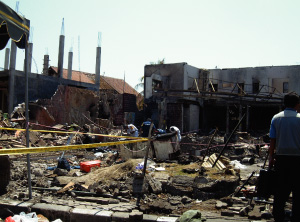 |
| Terrorist bomb attacks in Bali, Indonesia (October 2002) |
-Car suicide bomb attack targeting a large American hotel in Jakarta, Indonesia(August 5, 2003)
A large American hotel in Jakarta, Indonesia was targeted by a car suicide bomb attack, leaving 12 people dead and over 150 injured.
-Terrorist bomb attack in front of the Australian Embassy in Jakarta, Indonesia (September 9, 2004)
A small-sized truck that was passing by the Australian Embassy in Jakarta, Indonesia exploded in front of the building, leaving 11 people dead and over 180 injured.
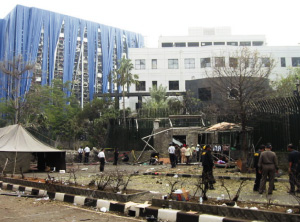 |
| Terrorist bomb attack in front of the Australian Embassy in Jakarta, Indonesia (September 2004) |
- Series of terrorist bomb attacks in Bali, Indonesia(October 1, 2005)
ãSimultaneous suicide bomb attacks took place in three restaurants in Bali, leaving 23 people dead (including one Japanese national) and over 140 injured.
B. Terrorism in the Philippines
Islamic extremist groups are actively operating in the Philippines, mainly in the southern region, with the aim of seceding from the country and establishing an Islamic state.
The "Moro Islamic Liberation Front", which holds influence on the Philippine's southern part of Mindanao, had been engaged in furious battles with the Philippine government. However, "Moro Islamic Liberation Front" and the Philippine government signed a cease-fire agreement in July 2003 and peace talks are currently advancing. However, some factions of "Moro Islamic Liberation Front" opposing to the peace talks are believed to still be actively committing terrorism in the country through collaborations with other Islamic extremist groups.
The Islamic extremist "Abu Sayyaf Group" , which also bases its activities in the southern Philippines and is striving to establish an independent Islamic state within the country, has been losing power due to the recent mop-up campaign by the government. However, it remains engaged in terrorist activities, such as attacks on the military and police and bomb attacks, including the "Terrorist Bomb Incident at the Davao International Airport in Mindanao Island."
It has recently been indicated that âAbu Sayyaf Groupâ is connected to terrorist activities committed by an organization composed of converts to Islam that operates mainly in the capital city of Manila.
It is said that the linkage between such terrorist organizations and "Jemaah Islamiya" has strengthened in recent years.
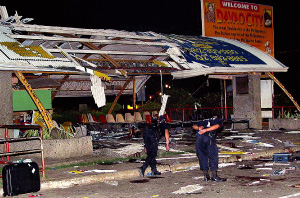 |
| Terrorist bomb incident at the Davao international airport in Mindanao island (March 2003) (Photo: Jiji Press) |
Southern Thailand is an area containing a great number of Muslims, and is historically considered to be a region of active separatist movements.
Since January 2004, there has been a succession of terrorist attacks aimed at security authorities and the like in Thailand, and a total of over 1,000 people have been killed thus far. The backdrop for this is said to not only be the separatist movement, but also factors such as power struggles among criminal organizations, and hostility toward the central government.
In February and April 2005, there was a car bomb incident and a terrorist act committed at an international airport located outside of the three southern provinces in which the previous attacks occurred. Due to a tendency to use methods not seen in the past, as well as conducting attacks in regions and against targets different from those previously observed, there is the fear that international terrorist organizations may be involved.
4. Threat of NBC TerrorismIn recent years, there is a heightened threat of terrorist attacks that use nuclear, biological, and chemical (NBC) materials. In 2001, incidents involving anthrax occurred in the United States, and in 2002 it was found that an American member of "Al-Qaeda" was planning to attack the United States using a "dirty bomb," which scatters radioactive substances. In January 2003, it was brought to light that in London, United Kingdom, Islamic extremists believed to be African in origin were in possession of highly poisonous material related to ricin. In February 2004, ricin was found in the mailroom of the US Senate Majority Leader in Washington, D.C.
It has been pointed out from time to time that "Al-Qaeda" and other international terrorist organizations have an interest in NBC terrorism, making it possible that incidents related to NBC terrorism will reoccur in the future.